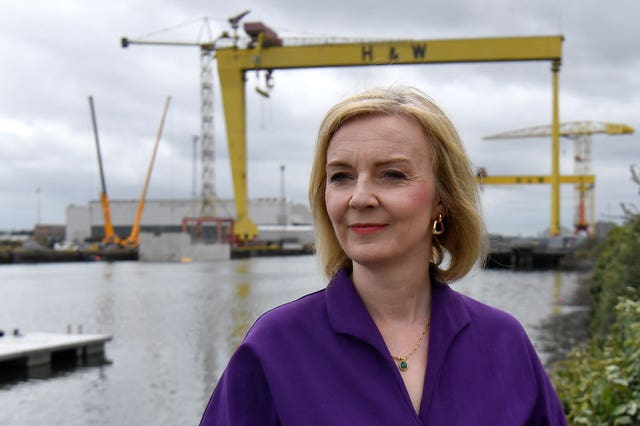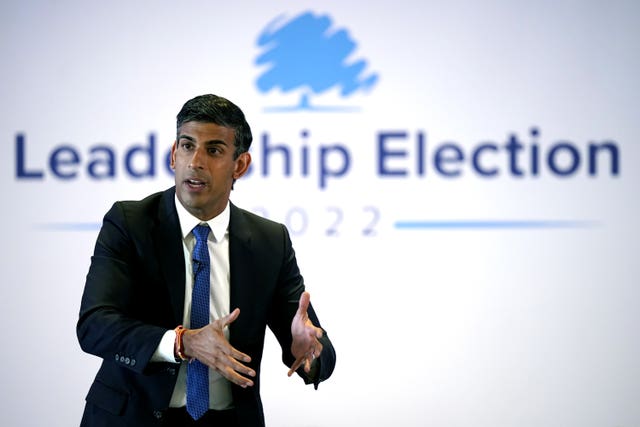Both Tory leadership candidates were forced on Thursday to confront a stark report from economists warning of the danger tax cuts could pose to the public purse.
Frontrunner Liz Truss and rival Rishi Sunak, who have repeatedly clashed over tax cuts and competing visions for the UK economy, were faced with a sobering analysis by the respected Institute for Fiscal Studies (IFS), which warned that “permanent tax cuts” could exacerbate pressures on public spending.
The warning comes amid a worsening economic outlook for the UK, with inflation rising to 10.1% in July, and as passengers across the country prepare to grapple with the latest wave of rail, tube and bus industrial action over the coming days.
Mr Sunak, who is believed to be trailing his rival in support among the party members set to choose the next Tory leader, used the IFS study to attack Ms Truss and her economic plans.
A Sunak campaign spokesman said the analysis “drives a coach and horses through Liz’s economic plan”.

“Rishi has consistently made the case that permanent, unfunded tax cuts would cause significant damage to the public finances and push inflation up higher,” the spokesman said.
High inflation and interest rates will push up public spending, including on benefits and pensions, the IFS predicts.
Combined with weak economic growth, this is likely to offset the effect of any expected increased tax intake.
The report warns: “A prudent prime minister and chancellor determined to deliver on the government’s existing fiscal targets and to manage the nation’s finances responsibly would be wise not to bank on higher revenues matching higher spending.”
Both candidates, during the latest campaign hustings in Belfast, doubled down on their economic policies as Mr Sunak said the Foreign Secretary would be guilty of “moral failure” if she does not focus on the nation’s poorest as he warned her policies could further stoke inflation.
Ms Truss instead insisted “taxes are too high and they are potentially choking off growth”.
Team Truss appeared unfazed by the IFS analysis, with a campaign source stressing that Ms Truss “would use an emergency budget to kickstart her plan to get our economy growing and put more money into the pockets of hardworking people”.
“Liz will cut taxes using the existing fiscal headroom and will get debt to GDP falling within three years. You cannot tax your way to growth, and business as usual will not do.”
It comes as Jacob Rees-Mogg, the minister for Brexit opportunities, suggested a cost-saving push in Whitehall could have gone further if it was not for Mr Sunak.
In the latest attack on the former chancellor by a senior Truss supporter and Johnson loyalist, Mr Rees-Mogg claimed a “tight control on spending and an emphasis on reducing fraud” had saved £3.5 billion between 2020 and 2021.
Mr Rees-Mogg, who is also the minister charged with government efficiency, wrote in the Telegraph: “Earlier this year, the Efficiency and Value for Money Cabinet Committee was established with a mission to save the taxpayer over £5.5 billion each year.
“This was sadly under-utilised by the former chancellor, but it must be a vital tool in the next prime minister’s arsenal for cutting waste and inflation.”
Ms Truss, who is seen to be gaining in support among her fellow MPs even as she continues to campaign around the country, also received a further boost as the widow of Nobel Peace Prize winner David Trimble backed her bid to become prime minister.
Lady Trimble wrote in the Telegraph: “I believe that in this contest, Liz Truss has the best record and a viable plan to protect our Union and Northern Ireland’s integral place within it.
“I know David thought the same. One of the last things he did before we lost him was to ask his son to collect his voting papers so he could vote for Liz.”

Both candidates remain under pressure to offer solutions to the cost-of-living crisis, which is overshadowing the contest as it enters its final few weeks.
The resignation of Ofgem director Christine Farnish, who quit in the belief the watchdog has not “struck the right balance between the interests of consumers and the interests of suppliers”, piled extra scrutiny on the approach the Government is taking on the crisis.
Ed Miliband, Labour’s shadow climate change secretary, claimed that the resignation showed the Government was “asleep at the wheel”.
“For 12 years, the Conservatives have totally failed to regulate (the) energy market. In no other country has 32 energy suppliers gone bust,” he said.
“We simply cannot allow the British people to suffer a further increase in bills. It is intolerable that the Conservatives continue to offer no solutions to this crisis, and oppose Labour’s plan.”




Comments & Moderation
Readers’ comments: You are personally liable for the content of any comments you upload to this website, so please act responsibly. We do not pre-moderate or monitor readers’ comments appearing on our websites, but we do post-moderate in response to complaints we receive or otherwise when a potential problem comes to our attention. You can make a complaint by using the ‘report this post’ link . We may then apply our discretion under the user terms to amend or delete comments.
Post moderation is undertaken full-time 9am-6pm on weekdays, and on a part-time basis outwith those hours.
Read the rules hereLast Updated:
Report this comment Cancel